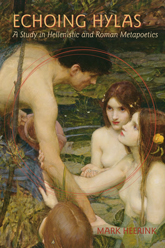Echoing Hylas
A Study in Hellenistic and Roman Metapoetics
Mark Heerink
Wisconsin Studies in Classics
Matthew Roller, Laura McClure, Mark Stansbury-O’Donnell, Series Editors
During a stopover of the Argo in Mysia, the boy Hylas sets out to fetch
water for his companion Hercules. Wandering into the woods, he arrives at
a secluded spring, inhabited by nymphs who fall in love with him and pull
him into the water. Mad with worry, Hercules stays in Mysia to look for the
boy, but he will never find him again . . .
In Echoing Hylas, Mark Heerink argues that the story of Hylas—a famous episode of the Argonauts’ voyage—was used by poets throughout classical antiquity to reflect symbolically on the position of their poetry in the literary tradition. Certain elements of the story, including the characters of Hylas and Hercules themselves, functioned as metaphors of the art of poetry. In the Hellenistic age, for example, the poet Theocritus employed Hylas as an emblem of his innovative bucolic verse, contrasting the boy with Hercules, who symbolized an older, heroic-epic tradition. The Roman poet Propertius further developed and transformed Theocritus’s metapoetical allegory by turning Heracles into an elegiac lover in pursuit of an unattainable object of affection. In this way, the myth of Hylas became the subject of a dialogue among poets across time, from the Hellenistic age to the Flavian era. Each poet, Heerink demonstrates, used elements of the myth to claim his own place in a developing literary tradition.
With this innovative diachronic approach, Heerink opens a new dimension of ancient metapoetics and offers many insights into the works of Apollonius of Rhodes, Theocritus, Virgil, Ovid, Valerius Flaccus, and Statius.
 Mark Heerink is an associate professor in Latin literature at the University of Amsterdam and VU University Amsterdam. He is the coeditor of Brill’s Companion to Valerius Flaccus.
Mark Heerink is an associate professor in Latin literature at the University of Amsterdam and VU University Amsterdam. He is the coeditor of Brill’s Companion to Valerius Flaccus.
Praise
“Every reader will welcome a
systematic appreciation of the
ways Greek and Roman poets of
different genres used the motif of
Hercules and Hylas to highlight the
primacy of poetics sharing the same
post-Callimachean awareness that
reality—even fictional reality—is
more complicated and nuanced
than the battlefield of the Homeric
heroes.”
—Marco Fantuzzi, Columbia
University and the University of Macerata
“Holds its own with the best recent work on intertextuality in Latin poetry. Heerink skillfully deploys a series of sustained and convincing readings in support of an overarching thesis about the metapoetic allegory of the myth. ”
—Philip Hardie, Trinity College, University of Cambridge
Of Related Interest
|

The Offense of Love
Ars Amatoria, Remedia Amoris, and Tristia 2
Ovid
A verse translation by Julia Dyson Hejduk, with introduction and notes |
|

Larger images
December 2015
LC: 2015008398 PA
208 pp. 6 x 9
|

